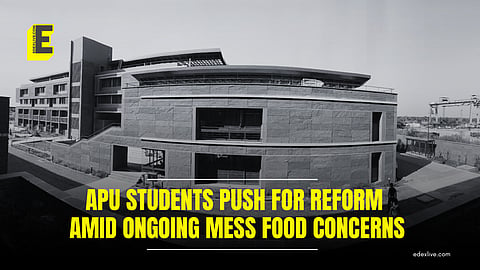

Students at Azim Premji University (APU), Bengaluru, have launched a protest against what they describe as persistent issues with food quality, pricing, and administrative inaction.
The movement, which has allegedly been brewing for over two years, has now reached a tipping point, with students demanding a university-run mess, transparency, and a direct role in managing campus food services.
So, let us look into what has happened so far.
For over two and a half years, students have been allegedly raising concerns about high food costs, poor quality, and lack of transparency in the mess system.
Currently, food services at APU are outsourced to a private vendor operating under a contractual basis, students say. Since the introduction of the current food vendor system in August 2023, students have raised concerns about escalating food costs — ranging between Rs 7,000 and Rs 8,000 per month, poor quality, and inadequate portion sizes.
A student, who spoke on condition of anonymity, described the deteriorating conditions, "Food quality at APU has been an issue even before I joined two years ago. The shift to the current vendor-run system has made matters worse. We’ve had multiple complaints about watery dal, stale food, and overpriced meals. Despite repeated complaints, the administration keeps citing contract limitations instead of addressing the core issues."
Several students have also highlighted a reportedly bizarre pricing structure where certain basic items — such as curd, papad, or salad — are charged separately in a meal, adding to the overall cost burden.
“While taste is subjective, there was a general consensus that the food was not worth the price being charged. There were also reports of food contamination, and a student-conducted survey showed that many students skipped meals — not just due to morning classes, but also because they actively avoided the food. This correlated with an increase in student health concerns, including more frequent illnesses,” the student added.
The students further informed EdexLive that when they attempted to raise these concerns with the university administration, they were told that any requests for improved variety or quality were simply “unfeasible within the contract terms.”
This led to growing frustration among students, especially after a large open house discussion last year failed to bring any real changes.
After several attempts of highlighting their grievances to the administration went in vain, in February 2025, the students conducted a campus-wide survey to document their concerns, gathering 797 responses. The results underscored widespread dissatisfaction:
66.9% of students want the university to run its own mess instead of outsourcing.
81.1% believe students should have control over food portions without extra charges.
62.7% say food prices are unreasonable.
69.5% feel the food does not meet their nutritional and health needs.
78.3% support lowering food prices.
85.1% demand student participation in food vendor selection, pricing, and menu decisions.
Most recently, on March 4, 2025, the Student Body engaged with the administration in an Open House meeting to discuss these issues. Subsequently, on March 18, 2025, students formally escalated their concerns by submitting a charter of demands to the Registrar’s office.
The demands included a university-run mess, more student-involvement in the food and mess-related matters, timely nutritional and quality checks, and an effective grievance redressal system.
This document included a proposed deadline for implementation by March 24. However, as of now, no response has been received from the administration.
The road ahead?
The situation remains ongoing, but the student movement has succeeded in bringing significant attention to the issue, increasing administrative accountability, and pushing for systemic changes to the food system at APU.
“While the administration has verbally acknowledged some of these concerns, no official confirmation of changes has been made. However, students who attended the recent meeting remain optimistic — something that wasn’t the case last month, which marks a significant shift,” said the student.
While recent meetings between students and university officials have signaled a shift toward engagement, no concrete assurances have been made. Student activists remain cautiously optimistic but insist they will continue their movement until tangible reforms are implemented.
EdexLive has contacted the university for an official statement on the ongoing issue. This report will be updated upon receiving a response.
